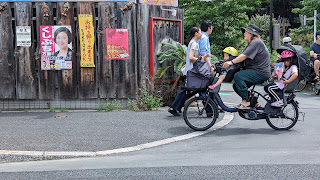I have a few observations on a very pleasant and productive trip to Hong Kong, with a brief visit to friends in Tokyo (that's in Japan, BTW; Hong Kong is not in Japan, for the Americans reading this who may not know 😉).
First, the level of English in the Mainland Chinese students I taught at a workshop was surprisingly high, noticeably higher than four years ago when I last taught this workshop. I asked several of them how they learned their English, and some have spent time in the US or UK, but not all. One said she has been attending English tutorial classes since she was in nursery school. The look on her face suggested she did not enjoy these classes, much like American-born Chinese hate going to Chinese school. But her English was very good, whereas most ABCs don't learn much Chinese. One young lady sticks out in my mind; she said her mother regretted that her own English was not good, and so sent her to a boarding school in New Jersey for a year when she was 14. The daughter then came back to China for high school and university, and now, 10 years later at 24 years of age, she is bilingual and will be a top candidate at any graduate program she applies to. Sadly, her mother passed away, so cannot see how successful her strategy has been. This young lady represents, for me, a new generation of cosmopolitan Chinese who were exposed to English in the early 2010s and now, a decade later, are comfortable in both English and Chinese.
Secondly, I attended a small conference where young mainland and Hong Kong Chinese students presented their research to each other. I was struck by how the students spoke openly about the limits of what can be said. No one made doctrinaire statements or argued politics, but I was struck by how, in an intellectual context, everyone could assume that everyone knew we were subject to authoritarian rulers. People were not being cautious; they were matter-of-fact. It reminded me of how in the US, in university settings I have been in, there is an open contempt for Trump and matter-of-fact criticism of his boorish ways, in a way that is different from pre-Trump days. On the one hand, the heavy hand of the state and CCP is obvious (Chinese University still requires a University ID to enter the campus, though no ID is required at HKU). On the other hand, I'm told that it is now harder to get into Chinese University because high school graduates are choosing Chinese University over HKU because it is viewed as more politically liberal. I was told that many people are leaving, but that while in the 1990s, before the 1997 Handover, people held "going away parties" before they left, now people are leaving quietly. Often, I'm told, people find out someone has emigrated only once they see their friends' pictures set in the UK. I met one student who is accommodating to the new pro-Beijing rule, but it seems most people who are staying are waiting for the winds to change. As one friend put it, even Xi Jinping will not live forever, and his successors will have to respond to the problems and frustrations his policies are causing. From the US, it is easy to think of "the Chinese" and focus mainly on the nationalistic extremists and authoritarian ruling class, but the reality is much more diverse. And the problems of extreme nationalism and authoritarian thinking are unfortunately plaguing the US too.
 |
| Pedal-assist bike with children aboard |
 |
| Vulgar Texas traveler |
The flight attendants on my JAL flight bowed to the passengers in the waiting area before they boarded the plane (many passengers would not have noticed it, because it was not announced, but I saw it). It reminded me of how Thai rugby players bow to the audience before a Sevens match. My flight on JAL (which I choose because it was the cheapest ticket) included two meals and a snack. The meals were good, and I was charmed by the miso soup they served in paper cups, as an additional drink. The plane was an American-made Boeing 787, but it was the first time I have seen windows that do not have shades that you pull down, but have a button that you push that makes the window go dark, like the sunglasses that go dark in bright light. Very cool.
When I got to Chicago, I had to transfer to an American Airlines flight for my last leg home. Once in the airplane, the flight attendant announced that the toilet in the front of the plane was broken, so everyone would have to use the toilet at the back of the plane. Oh, and there is no WiFi, because the system is broken. To make matters worse, the flight attendants spent much of our 46 minute flight haranguing us with a sales pitch about the "great deal" we could get on an American Airlines credit card, for which they would give us 50,000 miles, which she said enough for a one-way ticket to Asia. The male flight attendant then had to go down the aisle holding brochures for the credit card to hand one out to anyone who wanted one (I did not see anyone take one), and the female flight attendant stood at the front of the plane as we deplaned, holding brochures fanned out in her hands. How humiliating. It's bad enough that flight attendants who are there primarily for safety in an emergency have to also serve food and drinks, but now they have to hawk credit cards. At the same time, their planes don't work properly.Finally, people in Missouri complain about the humidity here. But they don't know humidity. Here are my glasses after I exited a subway station in Hong Kong, where we have real humidity.
 |
| Real humidity |

3 comments:
Joe, thanks for this . . . love that humidity. :) ms
hi Joe, very interesting. It made me recall the Paul Theroux comment: "The Japanese have perfected good manners and made them indistinguishable from rudeness." Is that a seemingly clever line that is actually meaningless, or is Theroux on to something?
Bill, I do not have access to the book, but it sounds like Theroux is implying ritualized politeness is insincere, and that it can be a way of masking rudeness. That may be true in some circumstances (international politics, perhaps), but I have little patience for the view that formalized or ritually expressed politeness is insincere. Coastal Americans can also dismiss Midwestern politeness as ritualized and insincere. They are wrong, IMHO. The rituals are actually a cultural way of smoothing social interactions and expressing politeness in a way that all members of the culture will understand. It is the basis of civility, it seems to me.
Post a Comment